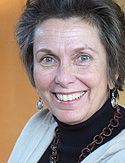 Het eerste marathon interview ooit, was in 1986 met W. F. de Gaay Fortman. Toen de VPRO de archieven opende en begon met de jaargang 1986 als podcast te publiceren, ontbrak het interview met de oude Gaay in de feed. Ik mailde dit aan de VPRO en enige tijd later kreeg ik het antwoord:
Het eerste marathon interview ooit, was in 1986 met W. F. de Gaay Fortman. Toen de VPRO de archieven opende en begon met de jaargang 1986 als podcast te publiceren, ontbrak het interview met de oude Gaay in de feed. Ik mailde dit aan de VPRO en enige tijd later kreeg ik het antwoord: Geachte meneer De Vries,
Het had wat voeten in de aarde, maar het interview met De Gaay is weer aan de karousel toegevoegd. Als het goed is, komt ie binnenkort op uw iTunes binnen. Leuk dat u van de interviews geniet en ook dat u er zoveel aandacht aan besteedt op uw website.
Met vriendelijke groeten,
Anne-Will Fisser
Bij deze dan ook aandacht voor het interview met W. F. de Gaay Fortman. Het valt meteen op dat de interviewer John Jansen van Galen de eminentie tutoyeert, terwijl De Gaay er juist een punt van maakt dat men tegenwoordig (let wel, het is 1986) te informeel is. Hij heeft het over de voornamencultuur en zet zich er nadrukkelijk tegen af. Hij slaagt erin om dat op een respectabele manier te doen. Er spreekt geen overdadige hang naar vormelijkheid uit, maar een behoefte aan zakelijkheid. En het scheiden van zakelijk en prive.
Hoe zit het dan met Jansen van Galen? In het tweede uur wordt uitgelegd dat de twee heren elkaar al geruime tijd kennen en dat De Gaay het 'tutoyement' gevraagd heeft. Kortom, de oude Gaay, hoewel hem het conservatisme niet ontzegd kan worden, laat zich ook van zijn vooruitstrevende kant zien. Het resultaat is van een waardigheid die mij wel kan bekoren.
